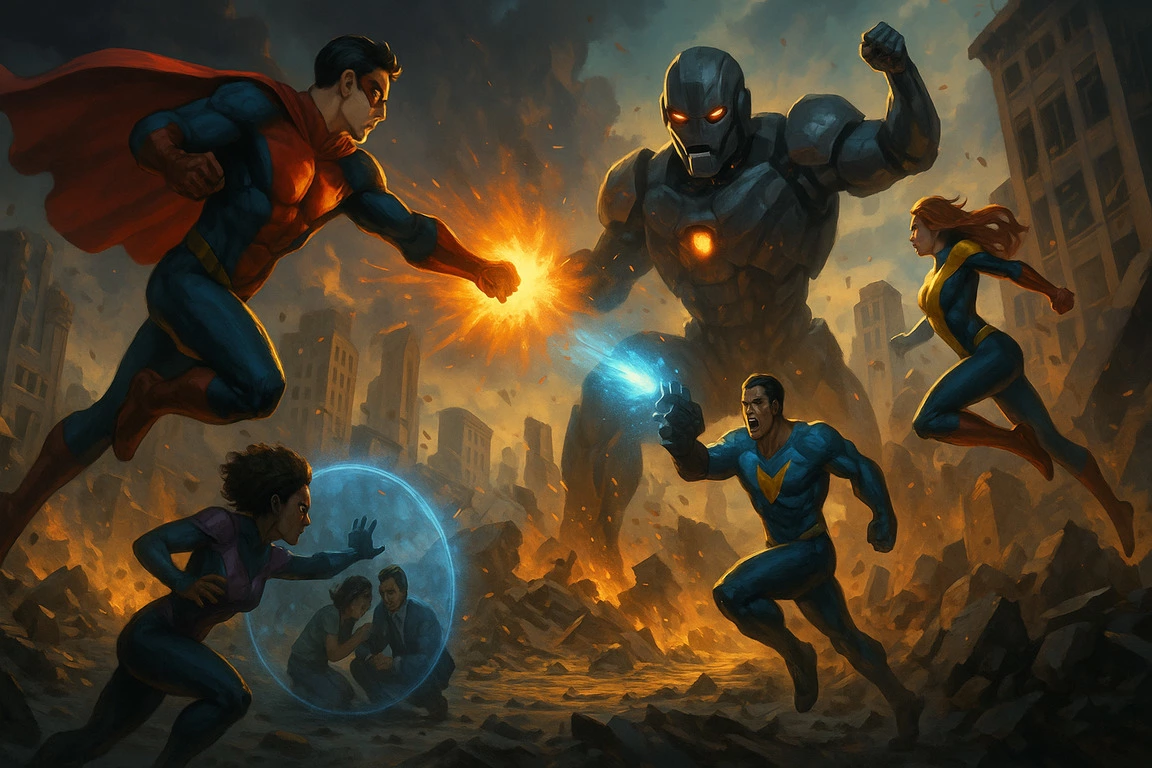In 2025, the boundaries between storytelling, gaming, and role-playing are increasingly blurred, thanks to rapid advancements in artificial intelligence. The concept of AI storytelling is no longer confined to generating text; it now powers dynamic, immersive experiences that adapt to player choices in real time.
For instance, TalkToStory has emerged as an innovative AI interactive story teller, enabling users to co-create narratives that evolve dynamically with their decisions. TalkToStory offers a unique experience where players can engage in real-time AI storytelling, with a smart companion that responds contextually to user inputs. This platform allows for diverse scenarios, ranging from romance to adventure, providing a rich, multi-character world that adapts to the player’s choices, enhancing immersion and personalization in storytelling.
The integration of artificial intelligence into gaming is not limited to independent platforms. Major industry players are embracing this powerful technology to enhance gameplay. For instance, Candy Crush Saga utilizes AI to design and balance its extensive library of over 18,700 levels, ensuring engaging and challenging experiences for players. Moreover, at the 2025 Game Developers Conference, nearly half of the surveyed developers reported using generative AI tools in their workflows, highlighting the technology’s growing influence in game development.
This convergence of AI storytelling and gaming signifies a transformative era in interactive entertainment. As technology continues to evolve, it promises to deliver more personalized, immersive, and dynamic experiences, redefining how stories are told and experienced in the digital age.
Love immersive experiences?
Join a growing TalkToStory Community and bring your characters, worlds, and stories to life alongside like-minded creators.
The Evolution of AI in Gaming Narratives
The integration of artificial intelligence into gaming narratives has transformed the landscape of interactive entertainment. From the rudimentary behaviors of early non-player characters (NPCs) to the sophisticated, dynamic storytelling experiences of today, artificial intelligence has progressively enhanced the depth and responsiveness of game narratives.
From Scripted Behaviors to Dynamic Interactions
In the early days of gaming, NPCs operated on simple, scripted behaviors, offering limited interaction with players. As technology advanced, developers began implementing more complex systems to create lifelike and responsive characters. For instance, the “Radiant AI” system introduced in The Elder Scrolls IV: Oblivion allowed NPCs to make decisions based on their environment and goals, leading to more organic and unpredictable interactions.
Similarly, games like F.E.A.R. employed Goal-Oriented Action Planning (GOAP) to enable enemies to adapt their tactics in real-time, creating a more challenging and immersive experience.
Procedural Content and Personalized AI StoryTelling
The advent of procedural content generation marked a significant milestone in AI-driven game narratives. By leveraging advanced algorithms, developers could create expansive game worlds and storylines that adapt to player choices. This approach not only increased replayability but also provided personalized experiences for each player.
For example, the PANGeA system utilizes large language models to generate narrative content for turn-based role-playing games, allowing for dynamic, free-form interactions that align with the game’s overarching story.
Such innovations not only enhance immersion but also open up possibilities for more emotionally resonant AI storytelling within games.
Love immersive experiences?
Join a growing TalkToStory Community and bring your characters, worlds, and stories to life alongside like-minded creators.
AI-Powered NPCs – Breathing Life into Game Characters
The advent of AI storytelling has revolutionized the gaming industry, particularly in the development of non-player characters (NPCs). Traditionally, NPCs operated on scripted behaviors, offering limited and predictable interactions. However, with the integration of advanced AI-powered algorithms, NPCs in games and AI interactive story-teller apps are now capable of engaging in unscripted, context-aware conversations, significantly enhancing realism and immersion in gaming and interactive AI story teller experience.
Fortnite’s AI-Driven Darth Vader
A notable example of LLM integration in gaming is Epic Games’ introduction of an AI-driven Darth Vader in Fortnite. In the “Galactic Battle” season, players can interact with Darth Vader, who responds using a voice that replicates the iconic tone of the late James Earl Jones. This feature was made possible through the collaboration of Google’s Gemini 2.0 Flash model and ElevenLabs’ Flash v2.5 model, which utilized archived recordings and generative AI tools to recreate Jones’ voice. Players can engage in real-time conversations with Vader, asking questions about the Force, the Galactic Empire, or even seeking strategic advice for gameplay. To ensure a safe and appropriate gaming environment, the system includes strict filters that block inappropriate content, such as offensive language or topics unrelated to the Star Wars universe. This innovation marks a significant step in creating dynamic interactions within game environments.
Ubisoft’s Neo NPC
Ubisoft has also been at the forefront of integrating AI into NPC development. Their project, known as “Neo NPC,” features characters like Bloom, developed in collaboration with Inworld AI and Nvidia. These AI-powered NPCs are designed to engage in real-time, unscripted conversations with players, adapting their responses based on the context of the interaction. The Neo NPCs leverage large language models to imbue characters with distinct personalities, backgrounds, and attitudes, allowing for more authentic and immersive player experiences. This approach pushes the boundaries of traditional NPC interactions, enabling players to form deeper connections with game characters.
The Broader Impact of Artificial Intelligence in NPC Development
The integration of LLMs into NPC development is not limited to individual games but represents a broader trend in the gaming industry. Companies like Nvidia are advancing AI-enabled technologies to create autonomous game characters capable of perceiving, planning, and acting like human players. These developments aim to replace static menus with natural dialogue, allowing NPCs to interact seamlessly with players and adapt to their actions in real-time. Such innovations are transforming NPCs from simple scripted entities into dynamic, lifelike characters that actively contribute to gameplay and deepen emotional connections between players and the game world.
In addition to these advancements, platforms like TalkToStory are redefining the boundaries between AI storytelling and interactive gameplay. TalkToStory enables users to engage in real-time, context-aware conversations with the characters, each possessing distinct personalities and backstories. This dynamic interaction allows players to influence narrative outcomes through their choices, fostering a personalized AI storytelling experience. By simulating authentic social exchanges, TalkToStory enhances immersion, making each narrative journey unique and resonant.
In conclusion, the fusion of AI storytelling and gaming is ushering in a new era of interactive entertainment. AI-powered NPCs are no longer confined to predetermined scripts but are evolving into complex, responsive characters that enhance the depth and realism of gaming narratives. As this technology continues to advance, we can anticipate even more sophisticated and immersive gaming experiences that blur the lines between player and character, narrative and gameplay.
Love immersive experiences?
Join a growing TalkToStory Community and bring your characters, worlds, and stories to life alongside like-minded creators.
AI as the Modern Game Master
The traditional role of the Game Master (GM) in tabletop role-playing games (TTRPGs) is to guide narratives, manage game mechanics, and adapt to player decisions. With advancements in artificial intelligence, it is now stepping into this role, offering dynamic AI storytelling experiences without the need for a human GM.
TalkToStory – Immersive AI Storytelling
TalkToStory is an innovative AI interactive story teller that transforms users from passive readers into active participants in dynamic narratives. By blending conversational artificial intelligence with user-driven choices, it offers a personalized AI storytelling experience across various genres, including fantasy, romance, sci-fi, anime, and romantasy.
The first release of TalkToStory offers narratives with structured plots and interactive chapters. Users make choices that influence character actions and drive the narrative forward, ensuring a unique experience with each playthrough.
At the heart of TalkToStory is its AI-powered roleplay feature, which enables real-time, context-aware conversations with characters. Users can interact with characters by typing their own responses or selecting from AI-suggested options that align with the plot. This hybrid interaction system blends structure with creativity, making every journey feel personal.
Characters in TalkToStory remember past interactions, react with emotional depth, and form evolving relationships with the user. This dynamic interaction fosters a sense of immersion and personalization, as the story adapts and responds to the user’s choices. Besides, each chapter includes custom illustrations that match the setting and characters, bringing scenes to life.
TalkToStory offers a comprehensive platform for immersive, interactive AI storytelling that adapts to the user’s imagination and choices.
AI Dungeon – Pioneering AI Storytelling
AI Dungeon is an AI interactive story teller that utilizes AI to generate evolving narratives. Players can choose from various genres and settings or create their own, with the AI-powered system adapting the storyline in real time based on player inputs. This allows for a personalized adventure where the narrative evolves uniquely for each player. AI Dungeon also supports multiplayer modes, enabling collaborative AI storytelling experiences.
Love immersive experiences?
Join a growing TalkToStory Community and bring your characters, worlds, and stories to life alongside like-minded creators.
AI Game Master – Immersive Text-Based RPG Adventures
AI Game Master is an AI interactive story teller that offers a text-based RPG experience, blending Dungeons & Dragons-inspired elements with advanced technology. Players can craft their own fantasy adventures, engage in free-text combat, and explore dynamic worlds. The platform also features a local multiplayer mode, allowing friends to collaborate in shared AI-generated stories.
StoryZone – Personalized Interactive AI Storytelling
StoryZone provides a user-friendly platform for creating and experiencing AI-generated stories. Players can craft personalized narratives by selecting characters, settings, and themes, with the system adapting the story based on these choices. This AI interactive story teller combines text and visuals to deliver an immersive read-and-play journey, making it accessible to both solo players and those new to TTRPGs.
AI Realm – Dynamic DnD-Inspired Adventures
AI Realm is an AI storytelling and RPG platform that allows players to create unique characters and explore dynamic worlds. The advanced AI Game Master adapts to player decisions, ensuring each adventure is unique and engaging.
CALYPSO – AI-Assisted Dungeon Mastering
CALYPSO is a system that leverages large language models to assist Dungeon Masters in TTRPGs. It provides high-fidelity text suitable for direct presentation to players and low-fidelity ideas that DMs can develop further, maintaining their creative agency. This AI-augmented tool supports DMs with information and inspiration specific to their scenarios.
These AI-driven platforms and tools are democratizing the TTRPG experience, making it more accessible to solo players and those without a dedicated GM. By offering dynamic AI storytelling that adapts to player choices, artificial intelligence is reshaping the landscape of interactive storytelling and role-playing games.
The Future of AI Storytelling & Game Narratives
As artificial intelligence continues to evolve, its role in shaping game narratives is poised to expand further. Developers are exploring ways to create more adaptive and emotionally intelligent systems that can respond to player emotions and decisions in nuanced ways. This could lead to games that offer truly personalized narratives, where the story evolves uniquely for each player based on their interactions and choices.
In conclusion, integrating LLMs into gaming narratives has significantly enriched the interactive experience, transforming games into dynamic AI storytelling mediums. As technology continues to advance, it promises to further blur the lines between player and storyteller, offering ever more immersive and personalized gaming experiences.
Love immersive experiences?
Join a growing TalkToStory Community and bring your characters, worlds, and stories to life alongside like-minded creators.
Related Articles





